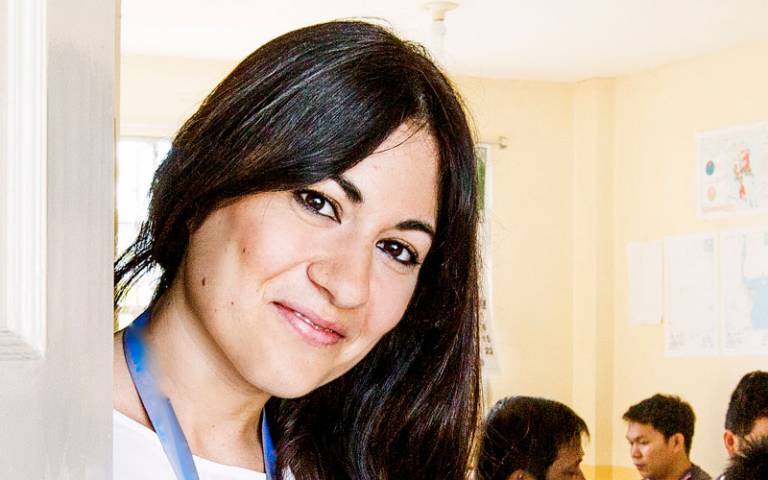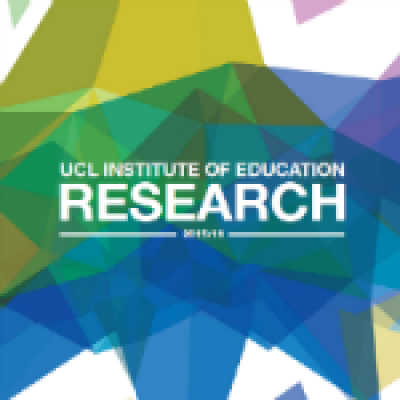Careers in Education and International Development - Fabiana Maglio
25 January 2018
Since graduating, Fabiana Maglio has forged a career as an Education Specialist including working for UNICEF in West and Central Africa. She tells us about her passion for education and future plans.

What were the highlights of your studies at the UCL Institute of Education?
Studying at the UCL Institute of Education was a fantastic and vibrant experience. I attended the Education, Gender and International Development MA with a focus on refugee education in 2013, while I was already working in the development sector. Back then, my assignments were mainly in the Middle East to support education initiatives in humanitarian and development contexts and required a lot of travel. So I decided to opt for the MA part-time mode, which included face-to-face courses as well as distance learning modules. The online component was very innovative. Students could log online in their own time and undertake learning through group discussions and module exercises under the guidance of a lecturer. It was very flexible because you could be based anywhere in the world and still be able to do your courses on Moodle and meet your commitment.
While in London, I was truly impressed by the number of opportunities UCL provided for individual and group activities, seminars and conferences, where brilliant debates on global issues took place. It pushed everyone to learn from each other and consider fresh perspectives, which have opened my eyes to new stages of opportunity and strength.
How has your career developed since you graduated?
The time spent at the UCL Institute of Education was a learning, illuminating experience, which has provided me with a number of valuable lessons along the way.
First and foremost, it gave me the confidence and knowledge to work in complex and challenging educational contexts, having that academic underpinning. Knowing the theory behind the practice, I felt strong enough to adopt new ways of critical thinking, and utilize the skills learned at global level to fit the actual needs in various local contexts, such as West and Central Africa and Southeast Asia.
One big achievement was to strengthen my research skills across the social sciences, and be able to conduct field research in challenging environments in an ethical way, ensuring that this is done in a manner that does no harm.
What drives your passion for education?
I have been working in the field of education, conflict and emergencies for a number of years and I must say that I have always been driven by a sincere passion to make children's lives better. I have visited many schools in the field and listened to young students who, with a spark in their eyes, talked about how much education means to them and shared their aspirations for the future.
I have also worked side-by-side with government ministries to provide strategic advice for decision making and to contribute towards enhancing access to quality education. I can attest that the human interaction that is involved is extremely rewarding and life-changing. That certainly is one of the best ways to learn about the unique educational challenges that exist in low- and middle-income countries.
However, to operate in this sector can be extremely complex and challenging. It is not only about restoring quality learning for children affected by humanitarian crises, but also providing physical, psychosocial, and cognitive protection. It includes a significant commitment to operate in hostile, resource-limited settings in order to address children's immediate needs, such as overcoming high levels of emotional distress.
Schools in conflict zones are not always safe since educational buildings may be active targets of armed groups and classrooms may be damaged or no longer accessible (e.g. occupied by armed groups or used as temporary shelters). In this view, it is crucial to ensure that young students have access to safe learning environments, properly trained teachers, potable water and food, proper sanitation facilities and that they are protected during their journey to school.
Last but not least, it is essential that all pupils are provided with recreational opportunities to play, laugh and be happy so that they can enjoy being children again. In my opinion, the promise to bring all crisis-affected children back to school so they can actually start learning again cannot be fulfilled without this holistic approach.
What are your plans or goals for the future?
I see myself working in this sector, while being appointed with more complex tasks and eventually increasing my responsibilities to global level. I am particularly interested in the ethical and methodological dimensions of research with crisis-affected children and the need to achieve a clear, actionable framework for their safe participation in school-related activities in humanitarian contexts. Also, I loved studying at the IOE so much that I might to go back for a PhD!
Fabiana has volunteered as an alumni mentor and you can ask her or any of the thousands of other mentors for advice by joining the UCL Alumni Online Community. All UCL students and alumni can search the directory for a potential mentor from our pool of experienced alumni, make new connections and join a professional network.
 Close
Close


